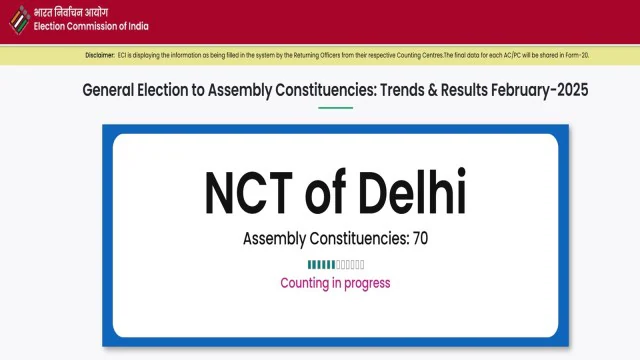The Election Commission of India (ECI) is an independent and self-governing body responsible for conducting and regulating elections in the country. ECI was formed in 1950 and has worked towards maintaining free, fair, and neutral elections on all levels ranging from Lok Sabha and State Legislative Assembly to the offices of President and the Vice President of India. Being the depository of responsibility, the ECI, as an institution of the country’s election system, strengthens the country’s democratic foundation by making sure that the system of free and fair elections is implemented.
The Election Commission of India: Structure and Composition
The Election Commission of India functions under Article 324 of the Constitution of India. The Commission started with a single-member body consisting of a Chief Election Commissioner (CEC), but subsequent amendments have transformed the Commission into a multi-member body by adding two more Election Commissioners. As it stands now, the ECI is comprised of a Chief Election Commissioner and two Election Commissioners, all appointed by the President of India, who hold office for a fixed term to guarantee their neutrality.
All powers regarding the hiring and removal of the Chief Election Commissioner and the Election Commissioners are vested in the President, although it is subject to the advice of other members of the governing body, which may include the cabinet. The Chief Election Commissioner, along with the several commissioners, serve a term lasting six years or until the individual reaches the age of sixty-five years old, whichever occurs first. Irrespective of the above, both of the commissioners can only be removed from their position through the process of impeachment, similar to how a mirror does so for a Supreme Court judge. As such, both the Chief Election Commissioner and the commissioners are insulated from political or executive intimidation.
The Election Commission of India: Powers and Functions
The Commission’s stewardship goes well beyond issuing directives. It has been given a remarkable amount of power to manage and supervise elections in the nation. Some of its principal powers include:
- Election Management: The commission is responsible for the management of elections at the Central and State levels. The commission is responsible for the election from the issuance of notification, to the declaration of results.
- Enforcement of Ethical Codes: The ECI issues and implements the Model Code of Conduct (MCC) which is an attempt to provide reasonable terms of reference for political parties and candidates to ensure equity and prevent malpractice.
- Maintenance of The Electoral Roll and Voter Registration: The Commission is tasked with ensuring that eligible citizens are registered to vote and are periodically verified and updated in the electoral rolls. It also ensures that periodic revisions and updates of electoral rolls are done.
- Election Monitoring and Technology Application: The commission sends observers, sets guidelines, and monitors the election processes. In any contested election, these activities are strengthened through the use of electronic voting machines (EVMs) and Voter-Verified Paper Audit Trail (VVPAT).
- THE RECOGNITION OF POLITICAL PARTIES: The ECI is responsible for the recognition of political parties and issuance of election symbols, which enables systematic organization and conduct of political activities.
- DISPUTE SETTLEMENT: The Commission has a primary role to resolve disputes arising from elections and party recognition, serving as a disinterested third party in all political adjudication.
CHALLENGES FACING THE ARCHITECT OF THE ELECTION COMMISSION OF INDIA
In spite of its constitutional authoritative sovereignty, the ECI faces challenges:
- Political Influence: The Commission is an autonomous body but there are claims of political interference in some actions which casts doubt on some decisions.
- Election Fraud: Many other practices such as directly bribing voters, casting votes on behalf of others, stealing ballot boxes are done by unscrupulous political parties and the EC is working to root out these evils.
- SKEPTICISM AMONG THE PROGRESSIVES: A powerful tool has emerged in politics with the single objective and that is money. Political parties excessively spend or use force as a means of coercion to manipulate voters thereby rendering election results as incredulous.
- Digital media is responsible for the commercial dissemination of misleading information and has increased the work of distinguishing fake data from the real one for electorates.
- Political Reforms: The ECI has made recommendations like financing elections from the state budget, issuance of stricter anti-defection laws, and the revealing of the identity of sponsors that set out sought to gain more credibility, though they need parliamentary approval.
- To enhance the electoral process, the ECI has integrated specific technological innovations such as:
- Electronic Voting Machines (EVMs): The introduction of EVMs in 1982 has improved voting and reduced practices such as booth capturing.
- Voter Verified Paper Audit Trail (VVPAT): VVPAT allows vote verification through a paper slip, leading to more transparent election results.
- Online Voter Registration: The Commission has also implemented more online means for citizens to register and change their information.
- Election Apps and Social Media Monitoring: Social media platforms are now monitored by the ECI to reduce misinformation as well as ensure adherence to the MCC.
Conclusion
The Election Commission of India remains the core component in the management of the world’s largest democratic nation and seeks to make certain elections are conducted honestly, freely, fairly and openly. It has to deal with challenges, but it has an adaptive attitude towards accepting technological changes and reforms which are needed to maintain the democratic principles of the nation. The ECI also has a central in managing the elections and governing the democracy as India continues to develop.
See: Election Commission Delhi Results 2025 LIVE Updates
Follow Fresh Scoop for more article like this!

